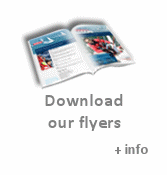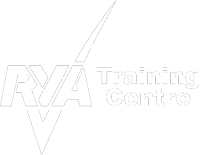| The VHF is probably the most important safety equipment on board, therefore it’s essencial to master its operation. Ahe VHF-SRC license (Short Range Certificate) is also the minimum certification required by law to operate a VHF or VHF with DSC (Digital Selective Calling). |
This course is taught using simulators and can be done in a class based (8 hours plus 4 hours of pre-study) or online (by Distance Learning).
In order to obtain the legal operator VHF-SRC certificate, beyond the course (class based or online), you have to aprove in the exam. This exam, which is also done in english, has two parts: a written test and a practical competence exam of the use of VHF with DSC.
In order to obtain the legal operator VHF-SRC certificate, beyond the course (class based or online), you have to aprove in the exam. This exam, which is also done in english, has two parts: a written test and a practical competence exam of the use of VHF with DSC.
Program
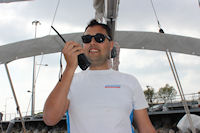 The program includes the following topics:
The program includes the following topics:The exam is always done in classroom and at our facilities and has a minimum 1 hour duration, however it should take at least 3 hours to be done. At West Coast, you can schedule your exam at any day of the week. If you have done the shorebased course with us (from 09h00am to 05h00pm) you’re free to do do the exam right on the same day. If you have done by distance learning you must contact us to schedule the day and the presence of the examiner.
The exam goes through the following steps:
Generally, the result is known right after the exam. All the documentation shipping process to the RYA is taken care by us, and the certificate shipment is done by the RYA by post directly to your address.
The written exam consists on a set of questions of multiple choice and development. It can cover any part of the program of the RYA VHF-SRC course.
The practical exam using the simulators can cover any of the following subjects:
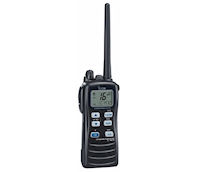 A. Mayday Communications
A. Mayday Communications
1. Define a Mayday Situation;
2. Initiate a DSC alert with manual or automatic position input;
3. Send a Mayday request;
4. Answer appropriately to a DSC mayday alert, including the “Mayday Relay”;
5. Know how to use and activate an EPIRB and SART;
6. Know all the procedures to cancel a mayday alert sent by mistake.
B. Urgency Communications
1. Identify an emergency situation;
2. IInitiate an emergency alert by DSC;
3. Send an emergency message by voice.
C. Safety Communications
1. Identify situations when a Safety message is required;
2. Initiate a safety alert by DSC;
3. Know how to receive information by Navtex.
D. Routine Communications
1. Initiate a routine communication using the DSC;
2. Test the VHF through a voice communication, using the right channels;
3. Register an individual and group MMSI;
4. Know how to keep a DSC watch on the channels by voice;
5. Know how to use the phonetic alphabet.
 A. Mayday Communications
A. Mayday Communications1. Define a Mayday Situation;
2. Initiate a DSC alert with manual or automatic position input;
3. Send a Mayday request;
4. Answer appropriately to a DSC mayday alert, including the “Mayday Relay”;
5. Know how to use and activate an EPIRB and SART;
6. Know all the procedures to cancel a mayday alert sent by mistake.
B. Urgency Communications
1. Identify an emergency situation;
2. IInitiate an emergency alert by DSC;
3. Send an emergency message by voice.
C. Safety Communications
1. Identify situations when a Safety message is required;
2. Initiate a safety alert by DSC;
3. Know how to receive information by Navtex.
D. Routine Communications
1. Initiate a routine communication using the DSC;
2. Test the VHF through a voice communication, using the right channels;
3. Register an individual and group MMSI;
4. Know how to keep a DSC watch on the channels by voice;
5. Know how to use the phonetic alphabet.
The VHF Handbook is included in your learning package and must be read before the shore based course or during the online course. The remaining books are optional.
| :: Recommended Books | ||
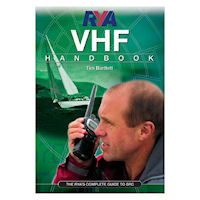 | 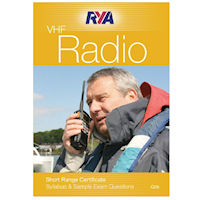 | 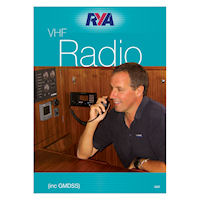 |
Prerequisits
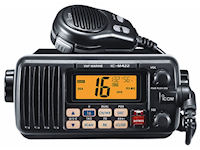
*("Aviation radio licence * Holders of either of these certificates are advised to attend the full Short Range Certificate Course, although, as an alternative, they may complete relevant self study and simply attend an exam.)
Duration
The online course can be done depending on your availability, but includes a minimum of 8 hours study and involvement beyond the additional readings.
Prices
RYA VHF SRC (Online)
€160
(VAT excluded, excludes exam costs)
(VAT excluded, excludes exam costs)
RYA VHF SRC (Presencial)
€160
(VAT included, excludes exam costs)
(VAT included, excludes exam costs)
Important Notes
Custos de Portes de envio dos packs de aprendizagem, aplicáveis apenas para os cursos online;
Exame Oral presencial. O valor mencionado são custos de exame pagos directamtente à RYA (valor em Libras GBP);
Preços incluem livro RYA VHF Handbook e emissão de certificado após aprovação em exame. Na opção online inclui ainda o acesso a recursos de aprendizagem online e apoio de tutor;
Preços por pessoa. Consulte sempre os nossos termos e condições detalhados que incluem condições de pagamento, falta desistência ou reprovação; IVA incluído à taxa legal em vigor.
Ask a Question about this Course


